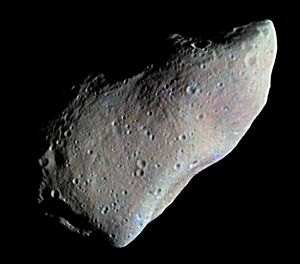Astrobiology facts for kids

Astrobiology is the study of life beyond Earth. It's about searching for life in outer space. This exciting field looks for what life needs to survive. Things like liquid water, a good temperature, or even oxygen are important.
Scientists think some places in our solar system might have life. These include Europa and Ganymede. These are moons that orbit Jupiter. Also, Titan and Enceladus, moons of Saturn, are interesting. These moons might have oceans of liquid water hidden under their icy surfaces. Even if the surface is very cold, the water underneath could be warm enough for life.
Astrobiology uses many different sciences. It combines physics, chemistry, and astronomy. It also uses biology, molecular biology, and ecology. Scientists also use planetary science, geography, and geology. All these fields help us look for life on other planets. They also help us understand if life elsewhere might be very different from life on Earth.
Images for kids
-
Nucleic acids may not be the only biomolecules in the universe capable of coding for life processes.
-
It is not known whether life elsewhere in the universe would utilize cell structures like those found on Earth. (Chloroplasts within plant cells shown here.)
-
Artist's impression of the extrasolar planet OGLE-2005-BLG-390Lb orbiting its star 20,000 light-years from Earth; this planet was discovered with gravitational microlensing.
-
The NASA Kepler mission, launched in March 2009, searches for extrasolar planets.
-
Hydrothermal vents support extremophile bacteria on Earth, provided an energy-rich environment for the origin of life, and may also support life in other parts of the cosmos.
-
Chart showing the theorized origin of the chemical elements that make up the human body.
-
Europa, due to the ocean that exists under its icy surface, might host some form of microbial life.
-
Mars Science Laboratory rover concept artwork
-
Artist's rendition of the Perseverance rover on Mars, with the mini-helicopter Ingenuity in front
See also
 In Spanish: Astrobiología para niños
In Spanish: Astrobiología para niños














